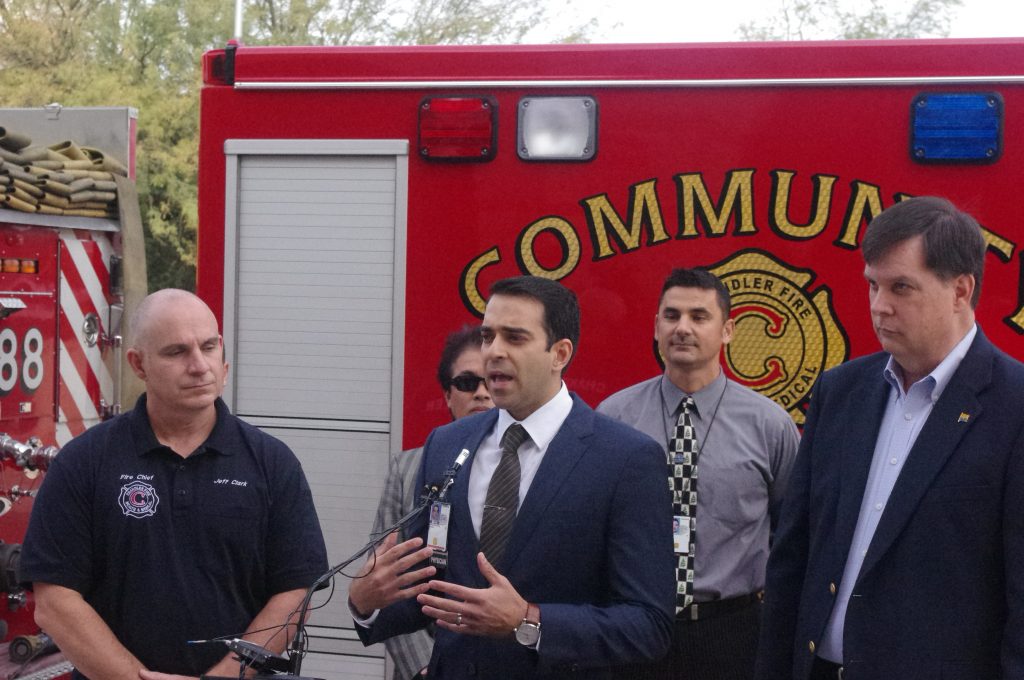
By Joyce Coronel
An innovative program in Chandler is aimed at helping veterans connect with health care resources before a crisis erupts. The new Community Involvement and Intervention Project involves specially trained paramedics collaborating with VA nurse practitioners.
The Chandler Fire, Health and Medical Department worked in conjunction with the Veterans Administration to develop the program at the behest of former Chandler City Councilman Rob Robson, Speaker Pro Tempore of the Arizona House of Representatives. Telemedicine will be one of the hallmarks of the effort.
Chief Jeff Clark of Chandler Fire, Health and Medical said the department is excited about the new program to help area veterans access their health benefits.
“We’re going to proactively visit veterans who are in need of health care and help treat them before their conditions become an emergency,” Clark said, lauding the efforts and vision of Robson.
Some 10,000 veterans live in Chandler, Clark said, noting that during the six-month-pilot program, the focus would be on educating them about “what their benefits are and connecting them with the health care they so richly deserve for the service they’ve provided this country.”
Tom Dwiggins, assistant chief of Chandler Fire, Health and Medical, said that many people, including veterans, have come to rely on the 9-1-1 emergency system because, for one reason or another, they don’t have access to a primary care physician.
“Whether they’re underinsured or they don’t have insurance or they don’t have a ride, or they have difficulties in navigating the health care system, they never see their primary care physician. What they end up doing is calling 9-1-1,” Dwiggins said.
“We would show up on scene, treat them and then refer them for primary care and they wouldn’t follow up. So they would get worse again and call 9-1-1. It was this endless cycle.”
The only way to break that cycle, Dwiggins said, was to get residents plugged into their benefits. The department came up with Community Paramedics, a unit that visits patients in Chandler before an emergency arises. They went through their call log and discovered that many people are repetitive callers.
“The VA has created a way to predict, based on a patient’s entire medical history, their family’s history, all these data points that they collect, they can tell us when somebody is close to having a medical crisis,” Dwiggins said.
Once the unit arrives at the house, the telemedicine aspect of the program kicks in. Community paramedics pull out their iPad and connect with a nurse practitioner at the V.A. As the paramedic measures vitals, takes an EKG and listens to the patient’s lungs, the nurse stands by at the VA, ready to offer advice.
“What we’re doing, essentially, is a doctor’s visit in their living room,” Dwiggins said.
“These veterans, for whatever reason, they don’t have transportation or they’re confused on the whole health care process. It’s very intimidating for them…We’re making it easy now—they’re sitting in their favorite chair and we’re conducting a visit right there.”
Robson said he thinks the program will be a success and eventually spread nationwide.
“You’ve got a veteran that’s got a wound problem or a diabetes problem or whatever and they’re able to identify it right up front,” Robson said.
“A firefighter is knocking at your door to see how you’re doing — that’s where it’s going and that’s what a veteran deserves.”
Dr. Hamed Abbaszadegan of the VA said that, many times, veterans have complex medical problems, often arising from “co-morbidities,” that is, the presence of two or more chronic diseases or conditions.
“We’re trying to find those people before they have any issues and reach out to them first,” Abbaszadegan said.
“We’ve seen everything from the common cold to strep throat to an ear infection,” Dwiggins said. “Some of these people they just don’t have any other avenues to get health care other than to use 9-1-1.”
Dwiggins recalled one patient who followed up with her physician and seemed motivated to get care, but wasn’t following discharge instructions. Community paramedics discovered by interviewing her that she was functionally illiterate. It wasn’t that she wouldn’t cooperate — she couldn’t read the instructions.
“The veterans in Chandler are going to be better served and I think the veterans in the entire state, too,” Robson said.
“What better program? Firefighters helping veterans. It’s what they do.”

